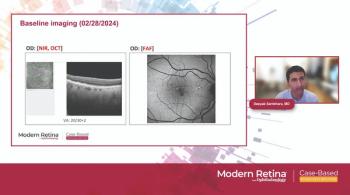
10 more companies share upcoming AAO presentation information
The annual American Academy of Ophthalmology meeting will include notable data and announcements for many companies in the ophthalmic space as they discuss upcoming and ongoing clinical trials as well as corporate and product developments.
The 2024 American Academy of Ophthalmology meeting is set to take place in Chicago, Illinois from October 18 through October 21, 2024. At this meeting, there will be many announcements from ophthalmic companies and presentations on data from clinical trials. Ahead of this event, there have been several announcements sharing what these presentations will discuss and the information in exhibition.
The following list is non-exhaustive and ordered alphabetically.
Alkeus Pharmaceuticals
The company will share results from its clinical studies of investigational oral gildeuretinol for the treatment of geographic atrophy secondary to age-related macular degeneration (SAGA) and Stargardt disease (TEASE) during the meeting.1
Gildeuretinol in geographic atrophy: Results from SAGA, a 2-year, randomized, double-masked, placebo-controlled study
- Presenter: Alexander Melamud, MD
- October 18, 4:25 pm CDT
Deuterated vitamin A preserves vision in Stargardt disease (TEASE Study)
- Presenter: Christine Nichols Kay, MD
- October 20, 4:01 pm CDT
Annexon, Inc.
Annexon will present new analyses of ANX007 from the completed Phase 2 ARCHER trial in geographic atrophy (GA). ANX007 is a first-in-kind, non-pegylated antigen-binding fragment (Fab) designed to block C1q locally in the eye with an intravitreal formulation.2
AAO 2024 Retina Showcase
- Presenter: Douglas Love, Annexon Biosciences
- Thursday, October 17, 2:27 pm CDT
Preservation of vision by ANX007: Clinical results and anatomical changes from the phase 2 ARCHER trial
- Presenter: Dr. Rahul N. Khurana, Northern California Retina Vitreous Associates and UCSF Medical Center Department of Ophthalmology, California, US
- Monday, October 21, 9:15 am CDT
Atsena Therapeutics
Safety and efficacy data on ATSN-201 for the treatment of X-linked retinoschisis (XLRS) will be presented at the event. ATSN-201 leverages AAV.SPR, the company’s novel spreading capsid, to achieve therapeutic levels of gene expression in photoreceptors of the central retina while avoiding the surgical risks of foveal detachment.3
Interim Safety and Efficacy of ATSN-201 Dose Escalation Study in Patients With X-linked Retinoschisis (XLRS)
- Presenter: Christine Nichols Kay, MD,
- Friday, October 18, 5:08 pm CDT
Avirmax Biopharma, Inc.
The company will participate in the exhibition hall to showcase the progress of the ABI gene therapy ocular programs. Avirmax Biopharma has innovated proprietary AAV2.N54 capsids optimized for superior gene delivery to the macula retina on basis of AAV2.4
Avirmax Biopharma's lead candidate ABI-110 for wet AMD is currently enrolling patients for Phase I/IIa trials in the US (NCT06550011). It has shown significantly improved tropism to the macular retina over wildtype serotypes and AAV2.7m8 in mice, rabbits, pigs, and non-human primates. The ABI-201 programs for geographic atrophy (GA), dry AMD, proliferative diabetic retinopathy (PDR), and the ABI-902 pipeline targeting multiple types of glaucoma are currently under nonclinical development.4
Beacon Therapeutics
The company has announced a poster presentation of the 24-month interim safety and efficacy results of the Phase 2 SKYLINE trial in patients with XLRP. This poster is entitled, “Subretinal AGTC-501 Gene Therapy for XLRP: 24-Month Interim Results of the Phase 2 SKYLINE Trial” and is authored by Robert Sisk, MD, FACS, FASRS.5
The 24-month data showed a response rate of 57% (4/7) in study eyes treated with a high dose (6.8 E+11 vg/eye) of AGTC-501, defined as a patient who has an improvement in retinal sensitivity as assessed by microperimetry of at least 7 decibels (dB) in at least 5 loci. Patients in the high-dose cohort also showed a robust improvement in mean retinal sensitivity. Study eyes treated with a low dose (7.5 E+10 vg/eye) of AGTC-501 showed a response rate of 25% (1/4). There were no clinically significant safety events associated with AGTC-501 treatment in this trial, and any treatment-emergent adverse events were mostly non-serious and mild to moderate in severity.5
Belite Bio
Belite Bio will present data from its completed Phase II adolescent Stargardt disease trial at the American Academy of Ophthalmology Annual Meeting.6
Tinlarebant (LBS-008) for Adolescents with Stargardt Disease
- Presenter: Quan Dong Nguyen, MD, MSc
- Saturday, October 19, 10:33 am CDT
- Arie Crown Theater (Lakeside Center building, 1F), Chicago, IL
Investigation of an Oral Retinol Binding Protein 4 Antagonist in the Treatment of Childhood-onset Stargardt Disease
- Presenter: Nathan L Mata, PHD
- Available on-demand
Eyenovia
The company will deliver a presentation detailing the results of a successful Phase 3 study (CPN-302) of clobetasol propionate suspension 0.05% (APP13007) that led to its approval by the FDA as a treatment for inflammation and pain following ocular surgery. Eyenovia announced the US launch and commercial availability of clobetasol on September 26, 2024.7
Clobetasol Propionate Ophthalmic Suspension 0.05% (APP 13007) for the Treatment of Postsurgical Inflammation and Pain (Study CPN-302)
- Presenter: Jeffrey H Levenson MD
- Available on-demand
LENZ Therapeutics
LENZ Therapeutics will present on LNZ100 during the Eyecelerator event at AAO 2024. LNZ100 is a preservative-free, single-use, once-daily eye drop containing aceclidine. The candidate achieved all primary and secondary endpoints in the registration-enabling Phase 3 CLARITY study as a potential therapy for the treatment of presbyopia.8
CLARITY Phase 3 study data of LNZ100 for the treatment of presbyopia
- Presenter: Marc Odrich, MD, Chief Medical Officer, LENZ Therapeutics
- Thursday, October 17, 1:15 pm CDT
Nanoscope Therapeutics, Inc.
The company is set to share end-of-study topline data from Nanoscope's RESTORE, a randomized-controlled trial (RCT) of MCO-010 therapy in patients with severe vision loss due to retinitis pigmentosa (RP). RESTORE is the first-ever RCT to show statistically significant visual acuity improvement in this patient population and a key part of the upcoming BLA submission planned for Nanoscope's RP program.9
Efficacy and Safety of MCO-010 Optogenetic Therapy for Vision Restoration in Patients with Severe Vision Loss Due to RP: Two-Year TOPLINE Results from a Phase 2b/3 Randomized, Sham-Controlled Clinical Trial (RESTORE)
- Presenter: Allen Ho, MD, FACS, FASRS
- Sunday, October 20, 2:00 pm CDT
ZEISS
ZEISS Medical Technology will showcase digital enhancements and revolutionary surgical solutions at the AAO conference. According to the company, these innovations across cataract, corneal refractive, retina, and glaucoma workflows, offer new, enhanced paths to patient management and treatment, using a digitally connected environment to help advance the clinical workflow to support a higher level of personalized care.10
References:
Alkeus Pharmaceuticals Announces Data Presentations at the American Academy of Ophthalmology (AAO) 2024 Annual Meeting, October 18-21 in Chicago. Alkeus Pharmaceuticals. October 17, 2024. Accessed October 17, 2024. https://www.globenewswire.com/en/news-release/2024/10/17/2964857/0/en/Alkeus-Pharmaceuticals-Announces-Data-Presentations-at-the-American-Academy-of-Ophthalmology-AAO-2024-Annual-Meeting-October-18-21-in-Chicago.html
Annexon to Present New Phase 2 ARCHER Data for ANX007 in Dry AMD Patients with Less Advanced GA at the American Academy of Ophthalmology 2024 Meeting. Annexon, Inc. October 15, 2024. Accessed October 17, 2024.
https://www.globenewswire.com/news-release/2024/10/15/2963132/0/en/Annexon-to-Present-New-Phase-2-ARCHER-Data-for-ANX007-in-Dry-AMD-Patients-with-Less-Advanced-GA-at-the-American-Academy-of-Ophthalmology-2024-Meeting.html Atsena Therapeutics to Present ATSN-201 Safety and Efficacy Data at the American Academy of Ophthalmology 2024 Annual Meeting. Atsena Therapeutics. October 10, 2024. Accessed October 17, 2024. https://www.globenewswire.com/en/news-release/2024/10/10/2961204/0/en/Atsena-Therapeutics-to-Present-ATSN-201-Safety-and-Efficacy-Data-at-the-American-Academy-of-Ophthalmology-2024-Annual-Meeting.html
Avirmax Biopharma Inc. to Exhibit Development of Next Generation Gene Therapies for Ocular Diseases at the AAO 2024 Annual Meeting in Chicago. Avirmax Biopharma Inc. October 15, 2024. Accessed October 17, 2024. https://www.prnewswire.com/news-releases/avirmax-biopharma-inc-to-exhibit-development-of-next-generation-gene-therapies-for-ocular-diseases-at-the-aao-2024-annual-meeting-in-chicago-302277135.html
Beacon Therapeutics Announces Positive 24-Month Data from Phase 2 SKYLINE Trial of AGTC-501 in Patients with X-Linked Retinitis Pigmentosa. Beacon Therapeutics Holdings Limited. October 15, 2024. Accessed October 17, 2024.
Belite Bio Announces Presentations at the American Academy of Ophthalmology 2024 Annual Meeting. Belite Bio, Inc. October 14, 2024. Accessed October 17, 2024.
https://www.globenewswire.com/news-release/2024/10/14/2962506/0/en/Belite-Bio-Announces-Presentations-at-the-American-Academy-of-Ophthalmology-2024-Annual-Meeting.html Eyenovia Announces Presentation of Phase 3 Clobetasol Study Results at the American Academy of Ophthalmology (AAO) 2024 Expo. October 16, 2024. Accessed October 17, 2024.
https://www.globenewswire.com/en/news-release/2024/10/16/2963893/0/en/Eyenovia-Announces-Presentation-of-Phase-3-Clobetasol-Study-Results-at-the-American-Academy-of-Ophthalmology-AAO-2024-Expo.html LENZ Therapeutics Announces Presentations at Upcoming Ophthalmology and Optometry Medical Conferences. LENZ Therapeutics, Inc. September 30, 2024. Accessed October 17, 2024.
https://www.globenewswire.com/en/news-release/2024/09/30/2955160/0/en/LENZ-Therapeutics-Announces-Presentations-at-Upcoming-Ophthalmology-and-Optometry-Medical-Conferences.html Nanoscope Announces Presentations at the American Academy of Ophthalmology Annual Meeting 2024. Nanoscope Therapeutics, Inc. October 15, 2024. Accessed October 17, 2024.
https://www.prnewswire.com/news-releases/nanoscope-announces-presentations-at-the-american-academy-of-ophthalmology-annual-meeting-2024-302273411.html ZEISS expands ophthalmic offerings to improve patient care with new digital AI tools and revolutionary surgical solutions. October 9, 2024. Accessed October 17, 2024. https://www.prnewswire.com/news-releases/zeiss-expands-ophthalmic-offerings-to-improve-patient-care-with-new-digital-ai-tools-and-revolutionary-surgical-solutions-302271146.html
Newsletter
Keep your retina practice on the forefront—subscribe for expert analysis and emerging trends in retinal disease management.










































